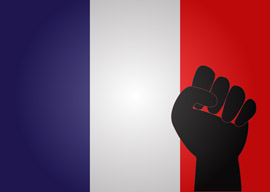
June 18, 2016

Source: Bigstock
Driving through France recently, we stopped for the night in the small town of Loudun. It had that complete, and to me pleasing or even consolatory, deadness common to many small French towns, where there seems to be no activity at all, nothing ever happens except on the tiniest scale, and all dramas are strictly private. There were a few desultory drinkers in the bar in Loudun, but that was all. Otherwise, the shutters were closed and nobody was about.
The quietness of a town at night has a special quality, which is more than the mere absence of sound, and it acts like a balm to the soul. During the Second World War, there was a British poster asking travelers whether the journey they were making was really necessary, nonessential travel supposedly detracting from the business of war; a French provincial town at night asks you, implicitly, whether what you are doing is really necessary. And the answer is almost invariably “No.”
Loudun is mainly famous, at least in the English-speaking world, for the book that Aldous Huxley wrote about an outbreak of mass hysteria in the 17th century (allegedly “possession” occasioned by the black magic of the local priest Urbain Grandier, who was executed) among nuns in an Ursuline convent there, called The Devils of Loudun. The book was the basis of a film made by Ken Russell, whose work was principally notable for its coarse and surrealistic debauchery. If Russell had made a film of the life of Queen Victoria or Mother Teresa, it would have been full of orgies.
As you drive through France it appears to be a country at perfect peace; and yet, at the very time I was remarking on this enviable state of affairs, a few hundred demonstrators against a projected law to liberalize very slightly the French labor market, wearing balaclavas and gas masks, were smashing windows in Paris, including those of a children’s hospital. The riot police fired tear gas; the prime minister fulminated against the demonstrators. The unrest over the projected law had by then lasted three weeks, and those opposed to it have vowed to continue their strikes and demonstrations until it is withdrawn.
The day before, the chief of a police station some thirty miles from Paris and his significant other, who also worked in the police station, were murdered in their home by a young Islamist fanatic named Larossi Abballa. Abballa, aged 25, entered the home of his two victims, stabbing the man first several times and then cutting the throat of the woman in front of her 3-year-old son. Before being shot dead by the police, he had time to post pictures of his handiwork on Facebook; he appeared to be obeying the call of Salim Benghalem, a French citizen who had joined the Islamic State, for Muslims in France to turn themselves into “lone wolves” who would “kill the evildoers with knives, or at least spit at them in the face.” The Islamic State subsequently claimed responsibility for the murders, though it is unlikely that it actually had anything to do with planning or carrying them out.
Abballa, like many of his type, was a common petty criminal before his weak intellect seized on the supposed glories of religious crime, the solution to his accumulated frustrations, resentments, and personal insignificance. He was not unknown to the security services; he had spent two years in prison for jihadist activity, having refused to answer the questions of his accusers because he considered them, from the great height of his own moral authority, to be unbelievers and evildoers to whom no duty was owed other than to kill as many of them as possible. While in prison he acted as an evangelist for jihad, but after his release he was, as we doctors so elegantly put it, lost to follow-up.
Which, then, is the real France, that of the perfect provincial peace (except for its domestic dramas), or that of fanatical demonstrators and assassins? To reply that all aspects of reality are equally real, and that therefore both are the real France, appears to be an evasion. Surely one tendency or the other must prevail, or at least determine the country’s future, even if only by the opposition it arouses?
Since perfect peace cannot hold our attention for long, accustomed as we are to a life of constant stimulation, we tend, or feel the need, to focus our minds on the dramatic. Without violent manifestations of discontent and criminality somewhere in the world, we should soon grow bored. Universal contentment is our worst enemy and greatest fear.
So we are predisposed to see in infrequent and dramatic events not merely the events themselves, but signs of the times, a glimpse of the future, a future that makes us shudder in the same way as a horror film makes us shudder. Infrequent and dramatic events have transcendent meaning for us, so to speak, in a way that reigning peace, however preponderant, does not and cannot have.